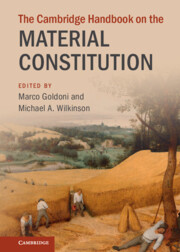Book contents
- The Cambridge Handbook on the Material Constitution
- The Cambridge Handbook on the Material Constitution
- Copyright page
- Contents
- Contributors
- Introduction
- Part I History
- Part II Challenges
- 11 The Material Constitution and Imperialism
- 12 The Material Constitution of Federations
- 13 The Materialist Turn in Constitutional Thought
- 14 Three Registers of the Material Constitution
- 15 What Matter(s)? A Processual View of the Material Constitution
- 16 The Material Constitution and the Rule of Recognition
- 17 Constitutional Matter and Form
- Part III Analyses
- Index
15 - What Matter(s)? A Processual View of the Material Constitution
from Part II - Challenges
Published online by Cambridge University Press: 15 January 2023
- The Cambridge Handbook on the Material Constitution
- The Cambridge Handbook on the Material Constitution
- Copyright page
- Contents
- Contributors
- Introduction
- Part I History
- Part II Challenges
- 11 The Material Constitution and Imperialism
- 12 The Material Constitution of Federations
- 13 The Materialist Turn in Constitutional Thought
- 14 Three Registers of the Material Constitution
- 15 What Matter(s)? A Processual View of the Material Constitution
- 16 The Material Constitution and the Rule of Recognition
- 17 Constitutional Matter and Form
- Part III Analyses
- Index
Summary
This chapter makes a case against a substantive understanding of the material constitution. It first centres on Carl Schmitt’s concrete-order thinking as a glaring example of a theory that attaches priority to the material over the formal and yet fails to explain where matter comes from. Materiality turns out to be a shorthand for the social, while what the social is remains mostly under-developed and eventually takes up communitarian and identitarian connotations. By building on Santi Romano’s and Karl Llewellyn’s theories, the author unearths an alternative notion of the material. The constitution is an institution in the sense of a set of organisational practices as practices, not their sedimented outcomes, such as behavioural standards, normative values or fundamental principles. Unlike substantive conceptions, the processual understanding easily accounts for how collectives make room for change of their substantive contents while preserving their collective character.
- Type
- Chapter
- Information
- The Cambridge Handbook on the Material Constitution , pp. 223 - 232Publisher: Cambridge University PressPrint publication year: 2023



